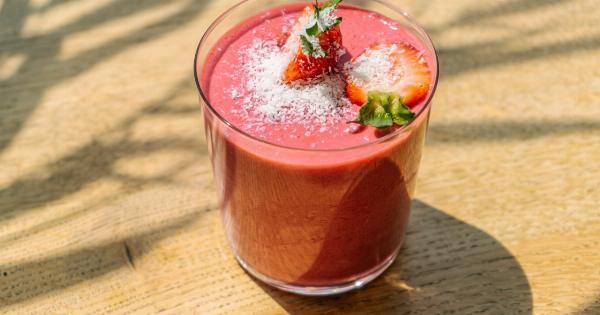Drinks are an integral part of our daily routine, providing us with hydration and often a burst of flavor. However, the impact of drinks on our overall health and well-being is not always well understood.
Scientific studies have sought to shed light on the effects of various beverages on our diet, raising questions about whether they can offer refreshment or potentially ruin our health. In this article, we will explore what scientific research says about drinks in our diet.
The Role of Hydration
Hydration is essential for our bodies to function optimally. Water is the primary recommended source of hydration, as it has no calories and helps maintain the balance of bodily fluids.
Scientists unanimously agree that staying well-hydrated is crucial for various bodily functions, including digestion, circulation, and temperature regulation.
The Benefits of Herbal Teas
Herbal teas have gained popularity for their potential health benefits. Varieties such as chamomile, peppermint, and ginger have been traditionally used for their soothing properties.
Scientific studies have begun to support these claims, revealing potential benefits such as improved digestion, reduced inflammation, and enhanced sleep quality. While herbal teas can be a refreshing and healthy addition to your diet, it is important to note that more research is needed to fully understand their effects.
Understanding the Impact of Coffee
Coffee is one of the most consumed beverages globally and has been a subject of extensive scientific research. While coffee is known for its caffeine content, it also contains various antioxidants and beneficial compounds.
Studies suggest that moderate coffee consumption may have several health benefits, including reduced risk of certain diseases such as type 2 diabetes, Parkinson’s disease, and certain types of cancer. However, excessive coffee intake or reliance on additives such as sugar and cream may have adverse effects on your health. It is essential to consume coffee in moderation and be mindful of what you add to it.
Exploring the World of Tea
Tea, especially green tea, has been hailed for its potential health benefits.
Green tea contains a high concentration of antioxidants called catechins, which have been associated with various health effects, such as improved heart health, brain function, and weight management. Other types of tea, such as black and white tea, also offer unique benefits due to their distinct compositions.
However, it is essential to avoid excessive consumption of tea, as it can have adverse effects on nutrient absorption and interfere with certain medications.
The Quandary of Carbonated Drinks
Carbonated drinks, such as soda and sparkling water, are popular refreshments but have sparked concerns due to their high sugar or artificial sweetener content.
Scientific studies have linked regular consumption of sugary carbonated drinks to increased risk of obesity, type 2 diabetes, and tooth decay. On the other hand, unsweetened sparkling water can be a hydrating and refreshing alternative to sugary beverages. It is crucial to read labels and opt for healthier options.
The Impact of Fruit Juices
Fruit juices are often marketed as natural and healthy choices. While they may contain essential vitamins and nutrients, they are also high in sugar and lack the beneficial fiber found in whole fruits.
Scientific studies have associated regular consumption of fruit juices with an increased risk of obesity and type 2 diabetes. It is advisable to consume whole fruits instead and limit fruit juice intake to small quantities or opt for freshly squeezed juices without added sugars.
Unveiling the Truth About Energy Drinks
Energy drinks have gained popularity among individuals seeking a quick boost in energy and alertness. However, these beverages often contain high levels of caffeine, sugar, and other stimulants.
Scientific research has raised concerns regarding the potential adverse effects of energy drink consumption, such as increased blood pressure, heart palpitations, and impaired sleep quality. It is essential to exercise caution and limit or avoid energy drinks altogether, especially for individuals with underlying health conditions.
Water Enhancers: Are They Beneficial?
Water enhancers, such as flavor drops and powders, have become increasingly popular as a way to make water more appealing. While they may make water taste better, it is important to understand the potential health implications.
Some water enhancers contain artificial flavors, sweeteners, and preservatives that may have adverse effects on your health. It is advisable to opt for natural alternatives such as infusing water with fruits or herbs.
Alcoholic Beverages: A Balancing Act
Alcoholic beverages are often enjoyed socially, but excessive consumption can have detrimental effects on health and well-being. Research suggests that moderate alcohol consumption may offer certain benefits, such as a reduced risk of heart disease.
However, excessive or frequent drinking can lead to addiction, liver disease, and other chronic health conditions. It is crucial to be mindful of your alcohol intake and prioritize moderation.
Milk and Dairy Alternatives
Milk and dairy alternatives play an important role in many people’s diets. Traditional cow’s milk is a significant source of calcium, vitamins, and minerals.
However, some individuals may be lactose intolerant or choose to avoid animal products. In such cases, plant-based milk alternatives such as almond, soy, or oat milk can provide similar nutrients. It is important to choose fortified options to ensure an adequate intake of essential nutrients.
Conclusion
The drinks we choose to incorporate into our diet can have a significant impact on our overall health and well-being.
While some beverages offer potential health benefits, others can have adverse effects when consumed in excess or with unhealthy additives. It is essential to stay informed, make mindful choices, and prioritize moderation. Remember, balance is key when it comes to your refreshment choices.





























